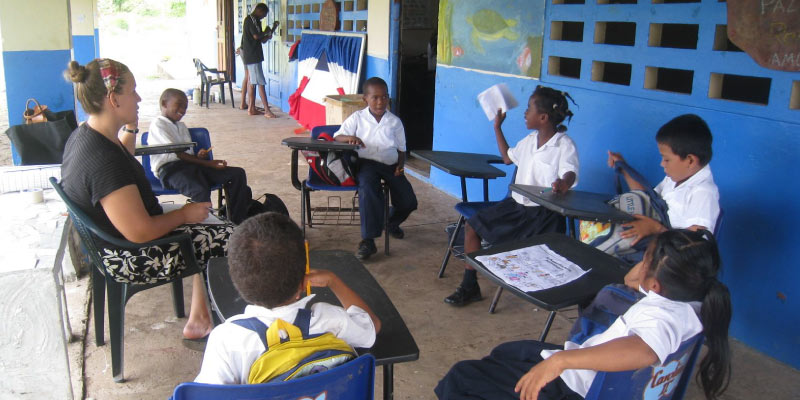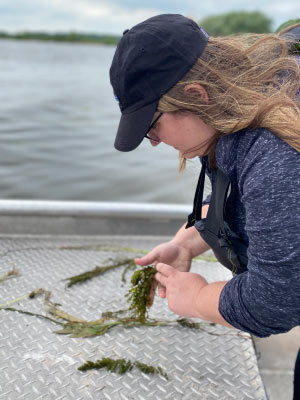
Finding one passion in life can be challenging enough, but for master of Environmental Conservation student Ashley Gries, one wasn’t enough. As an undergraduate student at Iowa State University, Gries majored in both Environmental Studies and Interior Design. These two passions allowed Gries to follow both of her dreams in conservation and design, giving her a unique perspective in both areas.
After graduating in 2007 with both of her undergraduate degrees, Gries and her husband joined the Peace Corpsand traveled to Panama, where they spent two years as environmental conservation volunteers based in a coastal community. They worked on sea turtle conservation, taught English courses, computer literacy, home gardening, and elementary environmental conservation. As there was no running water, Gries and her husband also helped the community create stable water supplies.
After traveling back to the United States, Gries started her own business, Casa and Co., where she sold “handmade modern heirlooms” across the U.S. and internationally. She eventually transitioned the business into a full-service interior design firm. But, after more than a decade of working in design, Gries felt a calling to get back into working in environmental conservation. “I wasn’t feeling very fulfilled with design work and was looking to get back into work along the lines of what I was doing in Panama – helping people and the environment,” said Gries.
This calling led her to enroll in the Nelson Institute for Environmental Studies where Gries is currently finishing her professional master’s in Environmental Conservation. The fifteen-month program educates students on the most pressing environmental issues of today along with practical interdisciplinary skillsets that aid in the many careers of conservation. Featuring both in-person and online courses, the Environmental Conservation MS also has students complete a three-month professional leadership experience with the goal of taking what students learned and applying it to real world situations.
Coming back to school after so many years can be a daunting task, but Gries knew that studying at the Nelson Institute was something she had to give her all. “I took an approach to my time to make sure I was going to get the most out of it,” said Gries. “I think as an older student I recognized the value of really putting my whole self into the program.”
Gries said she sought out additional courses to take full advantage of her time. One of which was a graduate-level independent study with Nelson Institute faculty associate Jessie Conaway. Conaway works as a Nelson Institute faculty associate for Native Nations_UW Partnerships and an Indigenous Arts and Sciences research coordinator with the Earth Partnership through the Department of Planning and Landscape Architecture. Learn more about Conaway’s latest work with tribal communities and environmental challenges.
The independent study with Conaway gave Gries extra opportunities within her field of interest. “I was able to engage with and learn from people and organizations that I would not otherwise have had access to… and I learned a lot about the work the university is doing to collaborate with Native Nations on and off campus,” said Gries.
Conaway shared similar sentiments from working with Gries saying, “Ashley is a powerhouse, and her work is driven by compassion and a great sense of humor. We have accomplished a lot through remote work during COVID-19… It has been wonderful to work with Ashley and also to work across Nelson program areas with the Environmental Conservation Professional Master’s program.”

Wanting to explore more within Native Nation studies, Gries has also been working with the Brothertown Indian Nation and Conaway on an Intertribal Lake Winnebago wild rice revitalization project. “It’s been really valuable to contribute to such a collaborative project between Native Nations, state and federal agencies, and the University,” said Gries. “It’s been a real privilege to support our Tribal partners in convening both traditional ecological knowledge and western knowledge in order to improve Lake Winnebago waterways and its traditional food systems.”
Now working on her professional leadership experience, Gries chose to get involved with The Nature Conservancy’s Colorado River Basin office. “The Nature Conservancy connection really came through the Nelson Institute and the professional conservation connections that they have,” said Gries. “So, when I expressed this interest, they were able to connect me with folks at the Nature Conservancy.”
Gries’ work at The Nature Conservancy focuses on both primary and secondary research: doing deep dives on the internet and conducting interviews with state and federal agencies, Native Nations, and conservation partners. “It’s a lot of finding information, sorting information, and extracting data,” said Gries. Her research will help The Nature Conservancy and their conservation partners understand the sometimes-hidden challenges that Native Nations face in accessing federal funding for water conservation projects. These findings in turn will provide leverage points for policy recommendations and enable conservation organizations to tailor outreach and programming to improve funding access for Tribes. Another project Gries is working on is community building between Native Nations in the Four Corners region of Colorado, Utah, Arizona, and New Mexico on important and pressing issues – water rights, water use, and protection of the southwest’s water.
Gries, who will graduate at the end of the summer, reflected on her time spent at the Nelson Institute during the COVID-19 pandemic. “My entire graduate career has been at home, which is a unique situation, but I’m grateful to have been able to tailor my experience to my interests and learn so much nonetheless.”
Learn more about the Environmental Conservation MS and how you can support the program.